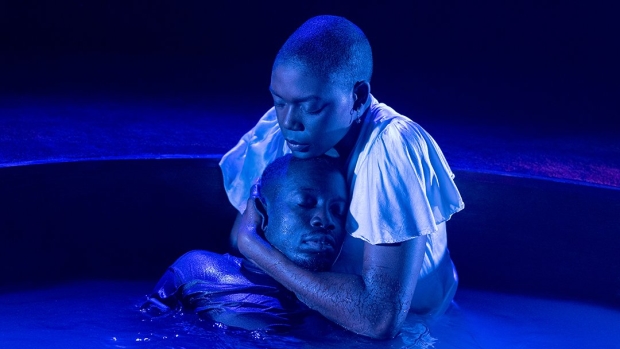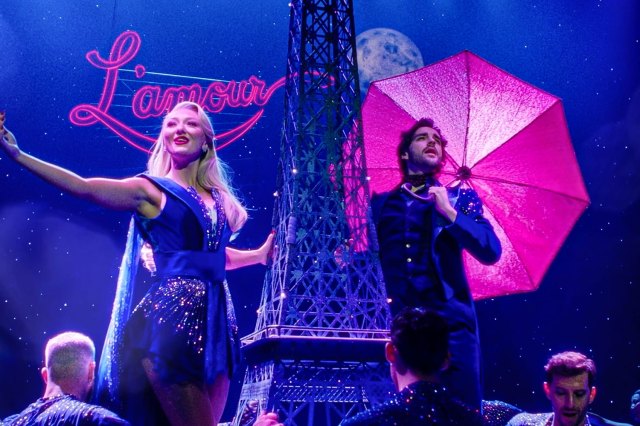
© Camilla Greenwell
A young black man sits with his legs dangling in a round pool of milky water. A tall, shaven-headed woman watches over him, carefully arranging bright flowers. Another woman stands by, anxious and worried.
This is the opening of Dipo Baruwa-Etti's An Unfinished Man, a bold, troubling, brilliant examination of the devastating effects of depression – one that in the hands of director Taio Lawson and his creative team manages to find powerful metaphors for this paralysing state.
Kayode (Fode Simbo) has been depressed for seven years. His state – represented by the pool of water in which he moves and which he cannot escape – means he can't find a job and it's beginning to affect his marriage to the British-born, ambitious Kikiope, who loves him, but is reaching the end of her patience. She wants him to see a counsellor, but he is convinced that he has been cursed on a visit to Nigeria as a child. That belief is encouraged by his mother (Lucy Vandi) and by the preacher Matanmi (Mark Springer) she brings in to "cure" her son against Kikiope's wishes.
The spirit which Kayode sees is called Itan, played by Selina Jones with fiercely graceful force. They speak together in their own language. At first, he feels she is a power for the good, as she gently embraces him (in Robia Milliner's choreography), winding her hands around his body. Later, he battles her, demanding she leaves. But all the while he ignores what she tells him – that she is the history he carries with him.
Pragmatic Kikiope, lent watchful compassion by Teri Ann Bobb-Baxter, on the other hand, suggests that some of what her agonised husband is feeling might be caused by the simple pressures of contemporary life and its expectations.
Baruwa-Etti, the 2020 Channel 4 playwright, and already announced as a thrilling, original talent by the monologue The Sun, the Moon, and the Stars, packs a huge amount into the 60-odd minute running time, and not every idea entirely hits its mark. But he is wonderfully served both by all the performances, and by a production which brings everything together with impressive confidence.
Rosie Elnile's setting mixes the real and the fantastical. Carpet covers the stage around the pool, and clothes hang on homely hangers on the walls, but Itan has her own kingdom on a ledge at the back of the stage, from which she descends with stately purpose, unseen by anyone except the suffering man. A row of giant speakers are lined at the rear, through which George Dennis's soundtrack throbs.
Ciarán Cunningham's lighting holds the same delicate balance, filling the space with purplish light when Matanmi undertakes his exorcism. Meanwhile, director Lawson sends his cast around the auditorium, looking down on Kayode even as they offer their thoughts about him. There's a terrible sense of powerlessness as they all try to help: here is a good man becalmed by his psychological state, grasping at straws in his efforts to escape it.
It all makes for an involving and moving experience, powered by a rare desire to engage with an intractable and rarely discussed topic, and to give it vibrant theatrical form.












